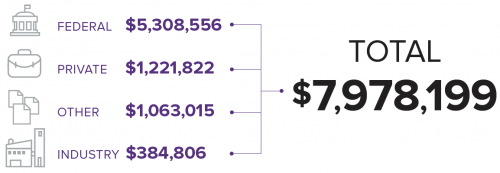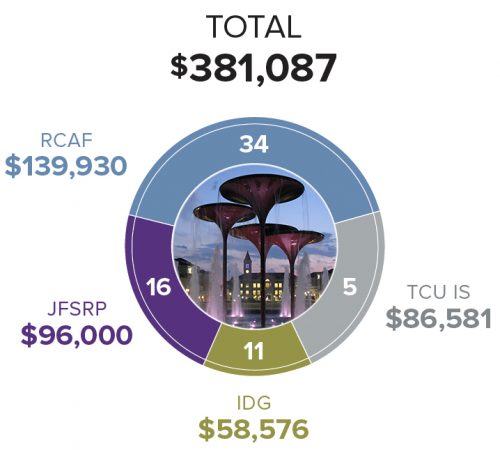How is Research Funded?
External funding and internal grants contribute millions of dollars toward research at TCU.
How is Research Funded?
External funding and internal grants contribute millions of dollars toward research at TCU.
Compiled by Caroline Collier
Graphic by Mike Del Vechio
External Awards for 2017

Sources of External Funding
 Department of Justice
Department of Justice
Michael Bachmann, associate professor of criminal justice, is joining Project Safe Neighborhoods with a $95,863 study intended to reduce gun- and gang-related crimes. Using big data sets, Bachmann will assist police departments with predicting probable times and locations of crimes.
 National Aeronautics and Space Administration
National Aeronautics and Space Administration
Kat Barger, assistant professor of astronomy, received $62,614 to analyze data she took from six sessions with the Hubble Space Telescope. Barger is crunching the numbers and studying characteristics on debris emanating from the Magellanic Cloud galaxies to better understand the process of new star formation.
 Private Funding
Private Funding
The Welch Foundation of Houston awarded Jeffrey Coffer, professor of chemistry, $80,000 to run a series of experiments combining silicon nanotubes with semiconductors and metals. Improving these minuscule structures might make LED lights brighter and computer chips faster.
 Department of Education
Department of Education
The TRIO: McNair Post-Baccalaureate Achievement Program awarded TCU $1,200,365 for a five-year program intended to assist first-generation and lesser-income undergraduate students who are interested in pursuing eventual doctoral studies. Selected students work on research opportunities in partnership with a TCU faculty member.
 Department of Energy
Department of Energy
Omar Harvey, assistant professor of geology, received a $448,579 grant to study interactions between organic materials and minerals — for example, how mulch degrades into the soil. His work has implications for the climate because these reactions determine how much carbon is stored in the ground and how much becomes carbon dioxide in the atmosphere.
 National Science Foundation
National Science Foundation
Working under the banner of the TCU Center for Urban Studies, Kyle Walker, associate professor of geography, is using advanced data analysis methods to study demographic inversion trends in American cities. He received a $283,983 grant to examine whether affluent white people are migrating toward central-city areas, while racial minorities and those living in poverty are moving to the suburbs.
 National Institutes of Health
National Institutes of Health
Danica Kaling-Knight, a senior research scientist at TCU’s Institute of Behavioral Research, received a five-year, $3,244,424 grant to improve drug abuse and HIV prevention programs aimed at adolescents in juvenile justice systems.
Internal Award Types

RCAF is the Research and Creative Activities Fund. TCU awards several dozen internal grants, each less than $5,000, every year for specific and well-developed faculty research projects.
TCU IS is TCU Invests in Scholarship. These internal grants, which range from $10,000 to $25,000, are designed to help faculty members advance research projects that are likely candidates for significant external funding.
IDG is the Instructional Development Grant. The Associate Provost for Research selects these awards to help faculty members develop new courses or improve existing ones.
JFSRP is the Junior Faculty Summer Research Program. Its purpose is to assist newer, tenure-track faculty members with developing their research and creative projects.
Source: TCU Office of Sponsored Programs
Photos by Getty Images

Your comments are welcome
Comments
Related reading:
Research + Discovery
Eclipsing Research
TCU astronomer Kat Barger shines a light on the Milky Way’s origins.
Features, Research + Discovery
Failure on a Small Scale: Tiny Holes Elude Silicon Researchers
Professor Jeffery Coffer doesn’t allow frustration to get in the way of solving a riddle.
The Geography of Heart Disease
Two TCU faculty are showing how cardiovascular disease spreads across Texas.